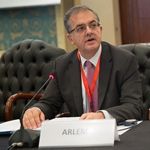
The Union for the Mediterranean has called for Euro-Mediterranean Regional and Local Assembly (ARLEM) to play an integral role in a new Urban Agenda for the Mediterranean. The request, contained in a declaration issued on 22 May by ministers of the Union for the Mediterranean's member states, has been welcomed by the European Committee of the Regions, which established ARLEM in 2010.
The declaration by the Union for the Mediterranean (UfM) asks ARLEM to provide input into "the design and implementation of policies", and to participate in a working group of a "UfM Regional Platform on Sustainable Urban Development" in order to discuss "the operational steps to be taken to implement the UfM Urban Agenda". The purpose of the regional platform would be to develop ways of "fostering innovative and sustainable solutions, promoting better knowledge and best practices on common urban development priorities, and identifying new projects that would be replicated in the region". The declaration also describes local authorities as having a "crucial role" in the implementation, monitoring and review of the new UfM Urban Agenda.
The UfM's Urban Agenda will contribute to achieving the United Nations' 2030 Agenda for Sustainable Development, which, in Goal 11, explicitly sets the target of making "cities and human settlements inclusive, safe, resilient and sustainable".
Speaking at the ministerial meeting in Cairo, ARLEM's rapporteur on a sustainable urban agenda for the Mediterranean region, Fawzi Masad of Jordan, said: "We need to enable local authorities to fully grasp their potential as drivers for sustainable urban development. It is in cities that the 2030 Agenda for Sustainable Development will succeed or fail. Key policies do not exist independent of the territory, and they have to all have to be played out in urban areas." Mr Masad is city manager for the Municipality of Greater Amman, Jordan's capital.
The UfM's declaration states that "The UfM Urban Agenda is based on a holistic, integrated, place-based and long term approach to sustainable urban development, necessary to promote well-managed, economically prosperous, gender and socially inclusive, just, safe, healthy, accessible and resilient, as well as resource-efficient and low-carbon environmentally sustainable cities".
The UfM says cities in the Mediterranean region face one of the fastest rates of urbanisation in the world, are suffering a "fast decline" in "many historical city centres" because of "the development of... major urban areas", and are highly vulnerable to climate change.
ARLEM was invited to the ministerial meeting by Corina Cretu, European Commissioner for Regional Policy, and Walid Masir, Jordan's Minister for Municipal Affairs. In addition to representatives of the 43 member states of the UfM, the ministerial meeting was attended by UN-Habitat, the European Investment Bank, the European Bank for Reconstruction and Development (EBRD), the World Bank, and the African Development Bank.
The European Committee of the Regions, the founder of ARLEM, is involved - in differing ways - in a variety of other international processes and agreements that the UfM identifies as shaping its Urban Agenda: the New Urban Agenda agreed at the United Nations Conference on Housing and Sustainable Urban Development (Habitat III) in Quito in October 2016; agreements within the United Nations Framework Convention on Climate Change; the UN's Sendai Framework for Disaster Risk Reduction 2015-2030; and the Urban Agenda for the European Union adopted in May 2016.